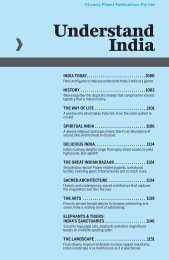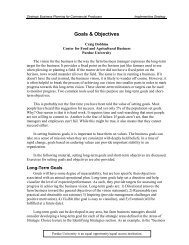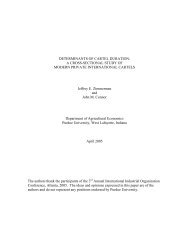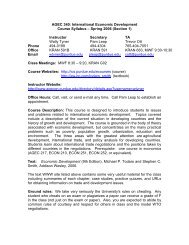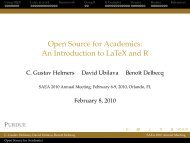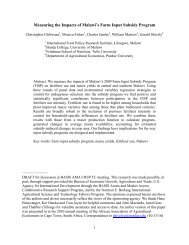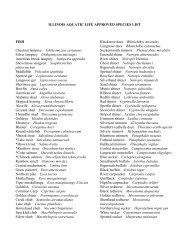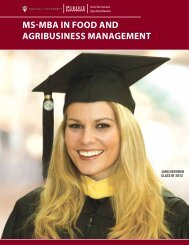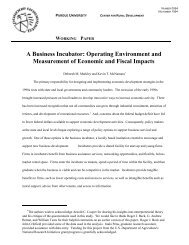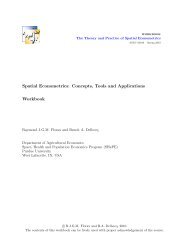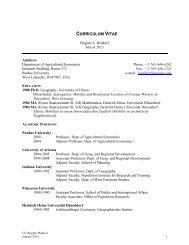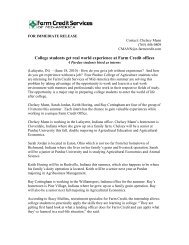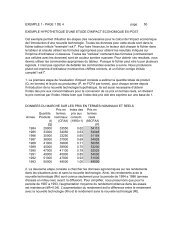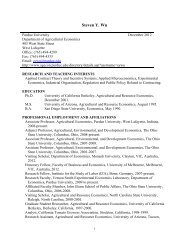Dr. Otto Doering awarded Certification of Distinction Generous gift ...
Dr. Otto Doering awarded Certification of Distinction Generous gift ...
Dr. Otto Doering awarded Certification of Distinction Generous gift ...
You also want an ePaper? Increase the reach of your titles
YUMPU automatically turns print PDFs into web optimized ePapers that Google loves.
Vol. VI, No. 1 Fall 2004<br />
<strong>Generous</strong> <strong>gift</strong> from James F. and Lois Ackerman<br />
Lois and James F.<br />
Ackerman<br />
James F. (Jim) and<br />
Lois Ackerman <strong>of</strong><br />
Indianapolis, Ind.,<br />
have generously<br />
given $1.5 million to<br />
Purdue University<br />
to endow the<br />
James and Lois<br />
Ackerman Pr<strong>of</strong>essorship in Agricultural<br />
Economics. Jim is a 1947 graduate <strong>of</strong> the<br />
Department <strong>of</strong> Agricultural Economics.<br />
He is a principal <strong>of</strong> Cardinal Ventures,<br />
LLC, a privately-owned partnership that<br />
seeks to acquire businesses that can<br />
be grown both internally and through<br />
acquisitions. Prior to forming Cardinal<br />
Ventures, Jim was the CEO and principal<br />
stockholder <strong>of</strong> Cardinal Communications,<br />
<strong>Dr</strong>. <strong>Otto</strong> <strong>Doering</strong> <strong>awarded</strong> Certifi cation <strong>of</strong> <strong>Distinction</strong><br />
Dan Arnholt and<br />
<strong>Dr</strong>. <strong>Otto</strong> <strong>Doering</strong><br />
<strong>Dr</strong>. <strong>Otto</strong> <strong>Doering</strong>,<br />
pr<strong>of</strong>essor <strong>of</strong><br />
agricultural<br />
economics, was<br />
<strong>awarded</strong> the highest<br />
award <strong>of</strong> the Purdue<br />
Agricultural Alumni<br />
Association, the<br />
Certifi cate <strong>of</strong> <strong>Distinction</strong>, at the Purdue<br />
Ag Alumni Fish Fry, Feb. 7, 2004. The<br />
Certifi cate <strong>of</strong> <strong>Distinction</strong> is recognizing<br />
those who have contributed signifi cantly<br />
to agriculture through pr<strong>of</strong>essional<br />
accomplishments, activity in organizations<br />
associated with agriculture, community<br />
service work, and other activities that make<br />
the nominees a credit to their pr<strong>of</strong>ession.<br />
<strong>Dr</strong>. <strong>Doering</strong> exemplifi es service leadership<br />
whereby leadership is demonstrated<br />
through service to others. <strong>Dr</strong>. <strong>Doering</strong><br />
brings groups and individuals with<br />
divergent interests together and promotes<br />
education on important economic and<br />
policy issues. He <strong>of</strong>fers an objective, well-<br />
Inc., the 70th largest U.S. cable television<br />
company at that time. That company was<br />
sold in 1993 after 21 years <strong>of</strong> operation. In<br />
addition to his responsibilities at Cardinal<br />
Communications, Jim was the executive<br />
director <strong>of</strong> Becker Communications<br />
Associates, a venture capital fi rm that<br />
specialized in making investments in<br />
the communications industry. Jim also<br />
served as vice chairman <strong>of</strong> Communication<br />
Equities, one <strong>of</strong> the country’s largest<br />
investment banks specializing in the<br />
communications industry. Other<br />
organizations Jim has served through<br />
board or <strong>of</strong>fi cer positions include the<br />
National Charge Account Bankers<br />
Association, the National Commercial<br />
Finance Association, and the National<br />
informed perspective on sensitive issues<br />
and is a highly effective educator both<br />
within and outside the classroom. As one <strong>of</strong><br />
<strong>Dr</strong>. <strong>Doering</strong> supporters wrote, “While <strong>Otto</strong><br />
enjoys the respect <strong>of</strong> key policy makers,<br />
even more important to Hoosiers is his<br />
ability to explain the new environmental<br />
and political realities we now face. Those <strong>of</strong><br />
us in agriculture who have been infl uenced<br />
by <strong>Dr</strong>. <strong>Doering</strong> are much more constructive<br />
in our engagement with those who would<br />
regulate us. Over the years I have had a<br />
chance to hear <strong>Otto</strong> make presentations<br />
in a wide range <strong>of</strong> classrooms and venues.<br />
His skills as a communicator and teacher<br />
are truly outstanding. Whether the<br />
audience was made up <strong>of</strong> my neighbors or<br />
managers <strong>of</strong> an international corporation,<br />
they left the room with a much better<br />
understanding <strong>of</strong> the nuances <strong>of</strong> the issues<br />
<strong>Otto</strong> discussed that day.”<br />
To read about other Agricultural Economics<br />
Faculty, please refer to our website at www.<br />
agecon.purdue.edu/directory<br />
Cable Television Association.<br />
Jim is currently a partner with The Chicago<br />
Corporation in its Midwest Bank Venture<br />
Capital Funds. Jim was recognized in<br />
1995 by Indiana Governor Evan Bayh as a<br />
Sagamore <strong>of</strong> the Wabash.<br />
Jim credits the Department <strong>of</strong> Agricultural<br />
Economics, and particularly Pr<strong>of</strong>essor<br />
Earl Butz, with helping him prepare<br />
for a career in business. Like Jim, the<br />
department believes that preparing young<br />
people for careers in business continues<br />
to be an important role. The Ackerman<br />
Pr<strong>of</strong>essorship will substantially strengthen<br />
the department’s ability to perform this<br />
role by providing greater resources to<br />
efforts in business education and outreach.<br />
Mark Your Calendars!!<br />
Ag Alumni/Homecoming<br />
Reunion - Oct. 16, 2004<br />
On the south end <strong>of</strong> the Memorial Mall,<br />
the School <strong>of</strong> Agriculture’s pre-game<br />
tent will open at 11 a.m. and begin<br />
serving a buffet to individuals with<br />
reservations, $12 for adults, at 12:30<br />
p.m. Free parking will be available in<br />
the Marsteller and University Street<br />
garages. Call the Agriculture Alumni<br />
<strong>of</strong>fi ce at 765-494-8593 to reserve your<br />
spot for the buffet or to order game<br />
tickets. Whether you eat at the tent<br />
or not, be sure to stop by and register<br />
for the door prizes. The Agricultural<br />
Economics Department will have an<br />
exhibit and give away trading cards<br />
featuring some <strong>of</strong> the “stars” <strong>of</strong> the<br />
team. “Veteran” and “rookie” faculty<br />
members who will be in attendance and<br />
featured on the trading cards include:<br />
Joe Uhl, Bob Taylor, Dave Downey,<br />
Jennifer Dennis and Joe Balagtas.
Department <strong>of</strong><br />
Agricultural Economics<br />
Quick Reference<br />
Sarahelen “Sally” Thompson, Ph.D.<br />
Department Head and Pr<strong>of</strong>essor<br />
(765) 494-4191<br />
sallyt@purdue.edu<br />
Graduate Program<br />
Paul Preckel, Ph.D.<br />
Associate Department Head<br />
and Pr<strong>of</strong>essor<br />
(765) 494-4240<br />
preckel@purdue.edu<br />
Lou Ann Baugh<br />
Graduate Coordinator<br />
(765) 494-4196<br />
baughl@purdue.edu<br />
Undergraduate Program<br />
Frank Dooley, Ph.D.<br />
Teaching Coordinator and Pr<strong>of</strong>essor<br />
(765) 494-4244<br />
dooleyf@purdue.edu<br />
LeeAnn Williams<br />
Academic Advisor and<br />
FIMM Coordinator<br />
(765) 494-0262<br />
leewill@purdue.edu<br />
Center for Food and<br />
Agricultural Business,<br />
and<br />
Purdue-Kelley MS-MBA in Food<br />
and Agribusiness<br />
Management<br />
Jay Akridge, Ph.D.<br />
Director and Pr<strong>of</strong>essor<br />
(765) 494-4327<br />
akridge@purdue.edu<br />
Center for Rural Development<br />
Kevin McNamara, Ph.D.<br />
Director and Pr<strong>of</strong>essor<br />
(765) 494-4236<br />
mcnamara@purdue.edu<br />
Global Trade Analysis<br />
Thomas Hertel, Ph.D.<br />
Director and Pr<strong>of</strong>essor<br />
(765) 494-4199<br />
hertel@purdue.edu<br />
Site Specifi c Management Center<br />
Jess Lowenberg-DeBoer, Ph.D.<br />
Director and Pr<strong>of</strong>essor<br />
(765) 494-4230<br />
lowenbej@purdue.edu<br />
Newsletter Managing Editor<br />
Debby Weber<br />
Newsletter Design<br />
Amanda Pauwels<br />
Building Human Capital<br />
A message from Sally Thompson, Department Head, Agricultural Economics, Purdue University<br />
One <strong>of</strong> the primary missions <strong>of</strong><br />
the Department <strong>of</strong> Agricultural<br />
Economics at Purdue is to build<br />
“human capital” that helps those<br />
we serve (students, farmers,<br />
agribusinesses, consumers, government<br />
<strong>of</strong>fi cials, and other analysts—both in the US<br />
and overseas) make better, more informed<br />
economic decisions. As Gary Becker, a pioneer<br />
in the study <strong>of</strong> human capital, and Nobel Prize<br />
winner in economics states:<br />
To most people capital means a bank account, a<br />
hundred shares <strong>of</strong> IBM stock, assembly lines, or<br />
steel plants in the Chicago area. These are all forms<br />
<strong>of</strong> capital in the sense that they are assets that yield<br />
income and other useful outputs over long periods<br />
<strong>of</strong> time.<br />
But these tangible forms <strong>of</strong> capital are not the<br />
only ones. Schooling, a computer training course,<br />
expenditures <strong>of</strong> medical care, and lectures on the<br />
virtues <strong>of</strong> punctuality and honesty also are capital.<br />
That is because they raise earnings, improve<br />
health, or add to a person’s good habits over<br />
much <strong>of</strong> his lifetime. Therefore, economists regard<br />
expenditures on education, training, medical care,<br />
and so on as investments in human capital. They<br />
are called human capital because people cannot be<br />
separated from their knowledge, skills, health, or<br />
values in the way they can be separated from f their<br />
fi nancial and physical assets.¹<br />
We build human capital in a number <strong>of</strong> ways<br />
depending on the needs and interests <strong>of</strong> those<br />
we’re serving. For students, we build human<br />
capital in the classroom with instruction in<br />
economic and management theory along<br />
with providing examples, case studies, and<br />
research results. We also provide students<br />
opportunities for experiential “hands on”<br />
learning through projects, study abroad, and<br />
internships. Many students learn to conduct<br />
their own research. For continuing education<br />
audiences and Extension clientele, we provide<br />
information about economic outlook, case<br />
studies, results <strong>of</strong> economic analyses, and<br />
economic decision support tools such as<br />
computer-based decision support aids that<br />
help our clients evaluate and make decisions.<br />
Sometimes we even slip in a little economic<br />
theory.<br />
We try to keep in close contact with those<br />
we serve and have a good sense <strong>of</strong> their<br />
decision-making needs and interests. This<br />
closeness builds our own human capital.<br />
Because we work closely with those we<br />
serve, we also have better access to data,<br />
information, examples, and case studies that<br />
we use in economic analysis and instruction.<br />
Department programs like the Top Farmer<br />
Crop Workshop, the Farm Management Tour,<br />
programs <strong>of</strong>fered by the Center for Food<br />
and Agricultural Business, the Agricultural<br />
Innovation and Commercialization Center,<br />
the New Ventures Team, and the Global Trade<br />
Analysis Project all help us stay relevant and<br />
aware <strong>of</strong> our client’s needs and economic<br />
environment. Our close contact with<br />
stakeholders directly improves our ability and<br />
effectiveness in building human capital.<br />
The economic decisions where human capital<br />
makes the greatest difference are those<br />
that haven’t been made before and those<br />
where individuals don’t have the benefi t <strong>of</strong><br />
experience. Although experience is one way<br />
to build human capital, we don’t always have<br />
fi rst-hand experience with every new decision<br />
situation. Costly errors are more likely in<br />
these situations if other human capital is also<br />
lacking. Human capital helps us analyze a<br />
new situation using theory, analytical models,<br />
and relevant case studies to predict possible<br />
outcomes <strong>of</strong> the new situation and make<br />
decisions most likely to lead to desirable<br />
outcomes. Many <strong>of</strong> those we serve frequently<br />
fi nd themselves in new situations, or<br />
“uncharted waters,” due to the rapid pace <strong>of</strong><br />
change in technology, government regulation,<br />
and business environment. By building their<br />
human capital, we can best prepare our<br />
students and clients to face new situations<br />
and navigate successfully through uncharted<br />
waters.<br />
In short, human capital is an asset that lasts a<br />
lifetime. By building human capital that helps<br />
individuals make good economic decisions,<br />
we make a lasting and positive impact on<br />
those we serve as they grow and prosper.<br />
¹Becker, Gary S., “Human Capital”, The Concise Encyclopedia <strong>of</strong> Economics. Liberty Fund, Inc. Ed. David R. Henderson. Library <strong>of</strong><br />
Economics and Liberty. 23 July 2004. .<br />
2 Purdue University � � Department <strong>of</strong> Agricultural Economics � � www.agecon.purdue.edu
Department Events and Honors<br />
Tom Davis and G. William Hoagland named 2004 Distinguished Agricultural Alumni<br />
On April 2, 2004, two Agricultural<br />
Economics alumni, Mr. Tom Davis and<br />
Mr. G. William Hoagland, were named<br />
Distinguished Agricultural Alumni during<br />
an awards convocation held in the Purdue<br />
Memorial Union ballrooms following a<br />
departmental luncheon and program held<br />
in the Krannert <strong>Dr</strong>awing Room.<br />
Mr. Tom Davis has<br />
had a career marked<br />
by accomplishment<br />
and recognition since<br />
graduating from Purdue<br />
in 1980 with a B.S. in agricultural<br />
economics. Mr. Davis became publisher<br />
<strong>of</strong> Meredith Corporation’s Successful<br />
Farming magazine on July 1, 2001. He<br />
is responsible for leading the overall<br />
strategic planning, marketing, circulation,<br />
research and fi nancial contributions <strong>of</strong><br />
the Successful Farming magazine pr<strong>of</strong>i t<br />
center. The center includes Successful<br />
Farming magazine, Agriculture Online,<br />
Successful Farming® Radio Magazine,<br />
custom publishing services programs, and<br />
ancillary sales. With a circulation <strong>of</strong><br />
442, 000 and 1.1 million readers,<br />
Successful Farming is the largest paid<br />
circulation farm magazine in the United<br />
States, as well as the largest advertising<br />
revenue farm publication. Mr. Davis has<br />
been with Successful Farming magazine<br />
since joining the advertising sales staff<br />
in Des Moines in 1978. In 1980, he was<br />
promoted to the Chicago branch and four<br />
years later returned to Des Moines as<br />
Branch Manager. In 1991, he was promoted<br />
to Regional Manager and then to Director<br />
<strong>of</strong> Advertising Sales in 1996.<br />
While at Meredith, Davis has been<br />
instrumental in leading several signifi cant<br />
projects with agrimarketers, including<br />
MAX program and the Farm Family<br />
Enrichment Conference. The MAX<br />
program was designed by the SF editorial<br />
team to promote farming with maximum<br />
effi ciency while participating in strong<br />
conservation practices. Mr. Davis<br />
coordinated the marketing efforts to major<br />
ag industry leaders. The Farm Family<br />
Enrichment Conference was another<br />
editorial project that he helped market to<br />
the agribusiness community. This<br />
on-site, three-day seminar was designed<br />
to help farm families deal with issues<br />
small businesses face every day. This<br />
conference was held in 1998 and brought<br />
400+ farm families together. Tom and<br />
his spouse, Sandy, live in Clive, Iowa, and<br />
have a son, Adam, who is attending the<br />
University <strong>of</strong> Kansas.<br />
Mr. G. William Hoagland<br />
reports to Senate Majority<br />
Leader, Bill Frist, M.D.<br />
Mr. Hoagland acts as a<br />
liaison to the leadership <strong>of</strong><br />
the United States Senate and House <strong>of</strong><br />
Representatives. He assists in evaluating<br />
the fi scal impact <strong>of</strong> major legislation and<br />
helps coordinate budget policy for the<br />
Senate leadership.<br />
Prior to coming to the Senate Majority<br />
Leader’s <strong>of</strong>fi ce in January 2003, he<br />
spent 20 years with the Senate budget<br />
Committee. On the Budget Committee<br />
he served as its staff director reporting<br />
to Senator Pete V. Domenici <strong>of</strong> New<br />
Mexico. Hoagland participated in major<br />
budget legislation including the 1985<br />
Gramm-Rudman-Hollings Budget Defi cit<br />
Reduction Act, the 1990 Omnibus Budget<br />
Reconciliation Act and the historic 1997<br />
Balanced Budget Agreement. He is versed<br />
in macroeconomics, federal Budget<br />
policy and procedure, agriculture, income<br />
security, food and nutrition policy, and<br />
researches and writes on the federal<br />
budget, income distribution and economic<br />
policies.<br />
In 1981 he served as the Administrator<br />
<strong>of</strong> the Department <strong>of</strong> Agriculture’s Food<br />
Nutrition Service. He also served as Special<br />
Assistant to the Secretary <strong>of</strong> Agriculture.<br />
He was one <strong>of</strong> the fi rst employees <strong>of</strong> the<br />
Congressional Budget Offi ce in 1975<br />
working with its fi rst Director, Alice Rivlin.<br />
He remained at CBO until 1981. The 1997<br />
National Journal listed him as one <strong>of</strong> the<br />
Washington 100 Decision Makers and<br />
referred to him as a “bottom-liner who is<br />
not a hard-liner.” He has consistently been<br />
ranked by the newspaper, Roll Call, as one<br />
<strong>of</strong> the top 50 Hill Staffers.<br />
Born in Covington, Ind., Hoagland<br />
attended the U.S. Merchant Marine<br />
academy and holds degrees in agricultural<br />
economics from Purdue University<br />
and Pennsylvania State University. He<br />
continues to be involved in the small<br />
Indiana farm that has been in his family<br />
for over a century.<br />
To read about other Agricultural Economics<br />
Alumni, please refer to our website at www.<br />
agecon.purdue.edu/alumni/<br />
New Dual Degree Program<br />
Announcing the Purdue University-<br />
Indiana University MS-MBA in Food<br />
and Agribusiness Management. This<br />
dual degree program is a joint <strong>of</strong>fering <strong>of</strong><br />
Purdue University’s School <strong>of</strong> Agriculture<br />
and Indiana University’s Kelley School <strong>of</strong><br />
Business. Making extensive use <strong>of</strong> distance<br />
technology, the program curriculum has a<br />
solid managerial foundation (36 credits),<br />
a focus on the food and agricultural<br />
marketplace (21 credits), and is designed<br />
to build and enhance a global perspective<br />
among participants. Only 5 weeks <strong>of</strong><br />
residency are required including an<br />
international trip.<br />
Contact:<br />
Luanna DeMay<br />
Program Manager<br />
luanna@purdue.edu.<br />
(765) 494-4270.<br />
www.agecon.purdue.edu/agribusiness<br />
Purdue University � Department <strong>of</strong> Agricultural Economics � www.agecon.purdue.edu 3
Department Events and Honors<br />
Retirement <strong>of</strong> <strong>Dr</strong>. Joe Uhl<br />
<strong>Dr</strong>. Joe Uhl has retired<br />
from the Department <strong>of</strong><br />
Agricultural Economics.<br />
After obtaining an<br />
MS in horticulture<br />
and a doctorate in<br />
agricultural economics from Michigan<br />
State University, he joined the Purdue<br />
Agricultural Economics faculty in 1966.<br />
His major areas <strong>of</strong> teaching, research and<br />
extension included the economics <strong>of</strong> food<br />
consumption, strategic market analysis,<br />
and food marketing.<br />
Pr<strong>of</strong>essor Uhl taught the department’s<br />
basic marketing course, Marketing <strong>of</strong><br />
Agricultural Products (AGEC 220) for 30<br />
years. He also taught Macroeconomics<br />
(AGEC 217), Advanced Marketing (AGEC<br />
620), Food Marketing (AGEC 426),<br />
Agribusiness Marketing Strategy (AGEC<br />
427/9), AGEC 333 Food Retailing, and<br />
Senior Seminar (AGEC 396).<br />
<strong>Dr</strong>. Uhl worked for many years with the<br />
student marketing team to compete in<br />
the National Agricultural Marketing<br />
Association’s national marketing<br />
competition, and was <strong>awarded</strong> the<br />
outstanding NAMA chapter advisor in<br />
1992. Pr<strong>of</strong>. Uhl developed one <strong>of</strong> the<br />
fi rst honors programs in the School <strong>of</strong><br />
Agriculture and served as director <strong>of</strong> the<br />
departmental honors program for many<br />
years. He was <strong>awarded</strong> the Outstanding<br />
Pr<strong>of</strong>essor in the School <strong>of</strong> Agriculture<br />
in 1985-86, received the American<br />
Agricultural Economics Association<br />
Distinguished Teaching Award in 1989,<br />
and was selected as the Outstanding<br />
Counselor in the School <strong>of</strong> Agriculture in<br />
1995. Pr<strong>of</strong>. Uhl regularly advised 30-35<br />
undergraduates.<br />
<strong>Dr</strong>. Uhl served the department in a<br />
number <strong>of</strong> capacities over the years,<br />
including Chair <strong>of</strong> the Graduate<br />
Committee, Chair <strong>of</strong> the Library<br />
Committee, and University Senator.<br />
Pr<strong>of</strong>essor Uhl is co-author <strong>of</strong> Marketing<br />
<strong>of</strong> Agricultural Products (with R.L.<br />
Kohls), 9th edition Prentice Hall (2002).<br />
He is currently preparing the 10th<br />
edition <strong>of</strong> this book. His pr<strong>of</strong>essional<br />
activities included editor <strong>of</strong> The Journal<br />
<strong>of</strong> Consumer Affairs from 1973-77; staff<br />
economist at the National Commission<br />
<strong>of</strong> Food Marketing in 1966; and visiting<br />
pr<strong>of</strong>essor at the University <strong>of</strong> Alabama<br />
and University <strong>of</strong> California-Davis.<br />
Pr<strong>of</strong>essor Uhl was a strong supporter<br />
<strong>of</strong> Purdue’s international programs. He<br />
50th Anniversary <strong>of</strong> Indiana Council for Economic Education (ICEE)<br />
Harlan Day and<br />
Sheila Klinker<br />
Based at Purdue<br />
University, the<br />
Indiana Council for<br />
Economic Education<br />
(ICEE) celebrated<br />
its 50th anniversary<br />
<strong>of</strong> providing<br />
teacher training<br />
and resources to<br />
K-12 educators<br />
with a gala celebration which took place<br />
Oct. 10, 2003, at the Indianapolis Athletic<br />
Club. Under the direction <strong>of</strong> Harlan Day,<br />
executive director, and Beverly Brewer,<br />
director <strong>of</strong> development and public<br />
relations, the program began with teacher<br />
awards followed by a demonstration<br />
<strong>of</strong> the Mini-Economy curriculum. The<br />
Mini-Economy is a program where<br />
students experience entrepreneurship in<br />
the classroom. The master <strong>of</strong> ceremonies<br />
was Scott Swan, news anchor at Channel<br />
13-WTHR, and the keynote speaker<br />
was Peter Harrington, former executive<br />
director <strong>of</strong> the ICEE. The evening included<br />
a silent auction and historical displays.<br />
The ICEE is a partnership <strong>of</strong> leaders from<br />
business, labor, agriculture, education,<br />
and government dedicated to increasing<br />
economic literacy in Indiana. Through a<br />
took a sabbatical as visiting pr<strong>of</strong>essor at<br />
Wageningen Agricultural University in the<br />
Netherlands (1990); he served as Study<br />
Director for the Purdue Study Abroad<br />
Program at the Ukrainian Agricultural<br />
Academy in Kiev (1992); he was a Visiting<br />
Pr<strong>of</strong>essor at Budapest University <strong>of</strong><br />
Economic Sciences in Hungary (Fall1994);<br />
and held short-term teaching assignments<br />
in Poland and Hungary from 1993-95.<br />
During 1994-95, he also served as project<br />
director <strong>of</strong> a faculty exchange program<br />
for Purdue and Hungarian pr<strong>of</strong>essors and<br />
served as the principal host for Russian<br />
and Ukrainian visiting pr<strong>of</strong>essors.<br />
Pr<strong>of</strong>. Uhl feels that his most cherished<br />
memories are from working with<br />
thousands <strong>of</strong> students at Purdue and also<br />
with the outstanding Purdue faculty. He<br />
says. “I learned as much or more than I<br />
taught. And I learned that you get what<br />
you expect in life and in the classroom.<br />
High expectations for students and others<br />
produce high performance. Thanks to<br />
everyone who touched my life.”<br />
To read about other former Agricultural<br />
Economics Faculty and Agricultural Economics<br />
History, please refer to our website at www.<br />
agecon.purdue.edu/directory/history<br />
statewide network <strong>of</strong> 13 regional University<br />
Centers, and in cooperation with the<br />
Indiana Department <strong>of</strong> Education, the<br />
ICEE provides economic education<br />
training, materials, and consulting<br />
assistance to thousands <strong>of</strong> Indiana<br />
educators each year.<br />
To read more about the Indiana Council for<br />
Economic Education, please refer to their<br />
website at www.econed-in.org<br />
4 Purdue University � � Department <strong>of</strong> Agricultural Economics � � www.agecon.purdue.edu
2004 Snyder Lecture and APEX awards<br />
<strong>Dr</strong>. Douglas Hedley,<br />
assistant deputy<br />
minister <strong>of</strong> the Farm<br />
Financial Programs<br />
Branch <strong>of</strong> Agriculture<br />
and Agri-Food Canada,<br />
was the featured<br />
<strong>Dr</strong>. Douglas Hedley<br />
speaker at the 2004<br />
Snyder Lecture and events. He presented<br />
“A Canadian’s Perspective on Agriculture<br />
and Agri-food Policy (Living with Lions:<br />
Serengeti or Circus?)” Among his many<br />
accomplishments, <strong>Dr</strong>. Hedley was the<br />
founding editor-in-chief <strong>of</strong> Agricultural<br />
Economics, the journal <strong>of</strong> the International<br />
Association <strong>of</strong> Agricultural Economics, and<br />
worked for the Rockefeller Foundation in<br />
Nigeria and Indonesia.<br />
The Snyder Lecture events took place<br />
April 15, 2004, in the Krannert <strong>Dr</strong>awing<br />
Room and Auditorium. A graduate student<br />
poster competition and dessert and c<strong>of</strong>fee<br />
social hour began the afternoon festivities.<br />
This was followed by the Inaugural<br />
A $1 million grant from the United<br />
States Department <strong>of</strong> Agriculture has<br />
allowed Purdue University to create<br />
the Agricultural Innovation and<br />
Commercialization Center (AICC).<br />
<strong>Dr</strong>. Mike Boehlje and <strong>Dr</strong>. Joan Fulton<br />
are the co-directors <strong>of</strong> the Center. The<br />
purpose <strong>of</strong> AICC is to provide education<br />
on, assessment <strong>of</strong>, and shepherding <strong>of</strong><br />
value-added products or processes from<br />
initial idea to value-added enterprise.<br />
These products or processes result from<br />
technological discoveries, producer ideas,<br />
or consumer needs identifi cation.<br />
New value-added ventures have the<br />
potential to signifi cantly increase incomes<br />
for producers and producer groups. Many,<br />
if not most, <strong>of</strong> these ventures involve a new<br />
innovative process, product, or technology.<br />
Helping producers and producer groups<br />
assess the potential <strong>of</strong> these innovations<br />
APEX awards presented in recognition <strong>of</strong><br />
individuals with a strong connection the<br />
Department <strong>of</strong> Agricultural Economics<br />
who have made outstanding contribution<br />
in their fi elds.<br />
The APEX crystal<br />
pyramid was<br />
presented to the<br />
following alumni:<br />
Noralyn Marshall,<br />
senior economist<br />
with MFR, Inc.<br />
Noralyn Marshall<br />
in New York and<br />
the fi rst female to graduate from the<br />
Agricultural Economics PhD program;<br />
<strong>Dr</strong>. Tom Funk, pr<strong>of</strong>essor <strong>of</strong> marketing in<br />
the Agricultural Economics department<br />
at the University <strong>of</strong> Guelph, Ontario, and<br />
Chairman <strong>of</strong> the Board <strong>of</strong> the AdCulture<br />
group; Steve Bishop, vice president<br />
for the North American Fabric Care<br />
division <strong>of</strong> Proctor and Gamble; and Ted<br />
Merrell, <strong>of</strong> Merrell Brothers, a company<br />
that specializes in development and<br />
A million dollar grant allows for the creation <strong>of</strong> the AICC<br />
is critical to developing successful valueadded<br />
ventures. Many innovative ideas<br />
are unsuccessful because they cannot meet<br />
technology, effi ciency, customer/user<br />
acceptance, competitive market pressure<br />
or investor expectation standards or<br />
performance criteria.<br />
AICC’s overarching purpose is to build<br />
capability and capacity that will assist<br />
innovators in assessing whether or not a<br />
specifi c innovation meets those criteria.<br />
After innovations have gone through the<br />
assessment phase, they are turned over<br />
to the New Ventures team for assistance<br />
in implementing their ideas. Educational<br />
seminars to producer groups will be<br />
another part <strong>of</strong> the center’s activities.<br />
Four projects have already been identifi ed<br />
for initial testing and business analysis.<br />
The projects include a soy-based laundry<br />
detergent additive, new pork products, a<br />
management <strong>of</strong> benefi cial biosolids reuse<br />
programs for municipalities, industries<br />
and livestock operations. The Department<br />
Focus featured <strong>Dr</strong>. Phil Paarlberg speaking<br />
about his work with <strong>Dr</strong>. John Lee and<br />
others on the economic impact <strong>of</strong> livestock<br />
diseases on consumers, producers and<br />
trade. <strong>Dr</strong>. Paarlberg and <strong>Dr</strong>. Lee received<br />
the 2003 best journal paper award from<br />
the Southern Agricultural Economics<br />
Association for their paper entitled,<br />
“Measuring the Welfare Effects <strong>of</strong> an FMD<br />
Outbreak in the United States.”<br />
Dale Whittaker, associate dean and<br />
director <strong>of</strong> Academic Programs, presented<br />
Teaching Academy Fellow and book <strong>of</strong><br />
Great Teachers Awards to <strong>Dr</strong>. Jay Akridge,<br />
<strong>Dr</strong>. David Downey, <strong>Dr</strong>. Robert Taylor and<br />
<strong>Dr</strong>. Larry Bohl.<br />
To read more about Agricultural Economics<br />
news, events and press releases, please refer<br />
to our website at www.agecon.purdue.edu/news.<br />
soy nutritional enhancement for food and<br />
a feasibility study for a corn mesa fl our<br />
plant. Purdue’s New Venture team is an<br />
integral component <strong>of</strong> the AICC.<br />
To read more about the AICC, please refer to<br />
our website at www.agecon.purdue.edu/aicc/<br />
WAVE hits Kansas City in<br />
National Marketing Competition.<br />
On April 14-15, 2004 in Kansas City, Mo., a team<br />
<strong>of</strong> students in Agricultural Economics advanced<br />
to the semifi nals after placing among the top<br />
eight teams in the competition hosted by the<br />
National Agricultural Marketing Association<br />
(NAMA). Teams decide on a project and develop<br />
a plan to successfully bring the product or<br />
service to the marketplace. The Purdue team<br />
with faculty f advisors, <strong>Dr</strong>. Christine Wilson and<br />
<strong>Dr</strong>. Joe Uhl, had 10 students involved with this<br />
year’s project to market WAVE, a soy-based<br />
gelatin product. The team spent the last several<br />
months doing market research, writing the<br />
marketing plan and developing a presentation.<br />
Purdue University � Department <strong>of</strong> Agricultural Economics � www.agecon.purdue.edu 5
New Faculty and Staff<br />
Joseph Balagtas,<br />
Assistant Pr<strong>of</strong>essor<br />
balagtas@purdue.edu<br />
<strong>Dr</strong>. Joseph Balagtas joined the Department<br />
<strong>of</strong> Agricultural Economics in August 2004,<br />
in the Applied Policy position. He will be<br />
teaching AGEC 220. He obtained his B.A.<br />
in Economics, from Miami University in<br />
1992, his M.S. from Iowa State University<br />
in Agricultural Economics in 1998, and<br />
his Ph.D. in Agricultural and Resource<br />
Economics, University <strong>of</strong> California, Davis,<br />
in June 2004.<br />
<strong>Dr</strong>. Balagtas conducts<br />
research on the effects <strong>of</strong><br />
government policy and<br />
regulation in agricultural<br />
markets. Recent work has<br />
addressed current policy issues in the<br />
U.S. dairy sector, including regional dairy<br />
compacts, the Australia-U.S. free trade<br />
agreement, the 2002 Farm Bill, and the<br />
dairy check-<strong>of</strong>f. He also has research<br />
interests in government policy for food<br />
safety and quality. <strong>Dr</strong>. Balagtas and his<br />
wife Clarinda have two sons, Luke and<br />
Henry.<br />
Jennifer Dennis<br />
Assistant Pr<strong>of</strong>essor<br />
dennis@hort.purdue.edu<br />
<strong>Dr</strong>. Jennifer Dennis, assistant pr<strong>of</strong>essor<br />
in Specialty Crop Marketing joined the<br />
Department in June 2004 and has a joint<br />
appointment in Agricultural Economics<br />
and Horticulture and Landscape<br />
Architecture.<br />
<strong>Dr</strong>. Dennis received her B.S. from the<br />
University <strong>of</strong> Illinois at Urbana-Champaign<br />
in Ornamental Horticulture (UIUC); M.S.<br />
from the University <strong>of</strong> Illinois at Urbana-<br />
Champaign in Horticulture/NRES and<br />
her Ph.D. at Michigan State University in<br />
Horticulture. She became interested in<br />
survey research methods at UIUC while<br />
working on the Illinois Green Industry<br />
survey, one <strong>of</strong> the fi rst economic impact<br />
surveys conducted for Illinois. Her M.S.<br />
and Ph.D. work had an emphasis on survey<br />
research and methodology, marketing and<br />
consumer behavior. <strong>Dr</strong>.Dennis worked<br />
closely with faculty in the Eli Broad College<br />
<strong>of</strong> Business at Michigan State University,<br />
<strong>Dr</strong>. Richard Spreng and <strong>Dr</strong>. Thomas Page<br />
Jr. They created an interdisciplinary<br />
dissertation topic focused on consumer<br />
satisfaction, cognitive appraisal theory and<br />
regret <strong>of</strong> horticultural products.<br />
Her research interest has focused primarily<br />
on marketing ornamental plants and<br />
related products and services, especially<br />
for the independent retail nurseries and<br />
garden centers. Her interest in aiding<br />
small businesses has become a passion.<br />
<strong>Dr</strong>. Dennis’ primary responsibility will be<br />
Extension working with small farmers,<br />
horticultural operations<br />
and specialty crop growers.<br />
She will also have a close<br />
relationship with the Indiana<br />
Farm Market Association.<br />
Dennis will teach a senior level<br />
marketing class, HORT 435 – Principles<br />
<strong>of</strong> Marketing and Management for<br />
Horticultural Businesses during the fall<br />
semesters. Pr<strong>of</strong>essionally, <strong>Dr</strong>. Dennis<br />
strives to develop a strong Extension<br />
and research program that will continue<br />
to generate new marketing information<br />
to help horticultural businesses<br />
maintain pr<strong>of</strong>i tability, identify potential<br />
opportunities and niches, and create<br />
sustainable competitive advantages.<br />
<strong>Dr</strong>. Dennis enjoys exploring Indiana with<br />
her husband, Donald and their three-yearold<br />
lab, Jasper<br />
<strong>Dr</strong>. Raymond J.G.M. Florax<br />
Pr<strong>of</strong>essor<br />
<strong>Dr</strong>. Raymond J.G.M. Florax will be<br />
joining the Department in January<br />
2005. <strong>Dr</strong>.Florax graduated from Tilburg<br />
University in The Netherlands, with B.A.<br />
and M.A. degrees in economics, and<br />
a BA in sociology. He holds a Ph.D. in<br />
economics from the University <strong>of</strong> Twente,<br />
in The Netherlands.<br />
His research centers on spatial<br />
and environmental economics,<br />
the use and development <strong>of</strong><br />
spatial econometric methods,<br />
and meta-analysis. He has<br />
substantial experience in the assessment <strong>of</strong><br />
impacts <strong>of</strong> knowledge and technology for<br />
processes <strong>of</strong> (regional) economic growth,<br />
and the relevance <strong>of</strong> location and space in<br />
land use patterns, precision agriculture,<br />
population-employment dynamics, and<br />
socio-economic externalities related<br />
to language acquisition. <strong>Dr</strong>. Florax<br />
has also worked on environmental<br />
issues related to water management<br />
and water valuation, and the effect <strong>of</strong><br />
domestic environmental regulation on<br />
international competitiveness and trade.<br />
The area <strong>of</strong> meta-analysis deals with<br />
research synthesis. His contributions<br />
to meta-analysis focus on developing<br />
quantitative techniques to combine<br />
and synthesize knowledge derived from<br />
exploratory qualitative studies as well as<br />
statistical models in order to gain a better<br />
understanding <strong>of</strong> the state-<strong>of</strong>-the-art <strong>of</strong> our<br />
knowledge about a specifi c topic.<br />
<strong>Dr</strong>. Florax has held academic and<br />
administrative positions at the Free<br />
University in Amsterdam, Wageningen<br />
Agricultural University, and the University<br />
<strong>of</strong> Twente, in The Netherlands, and visiting<br />
positions at the University <strong>of</strong> Arizona<br />
in Tucson, San Diego State University,<br />
and the University <strong>of</strong> Barcelona. He is<br />
a Fellow <strong>of</strong> the Netherlands Network <strong>of</strong><br />
Economics (NAKE), and co-authored over<br />
50 publications, in addition to two books<br />
and eight edited volumes and special issues<br />
<strong>of</strong> peer reviewed international journals.<br />
He is a member <strong>of</strong> two editorial boards,<br />
and editor-in-chief and European editor<br />
<strong>of</strong> the journal Papers in Regional Science,<br />
the <strong>of</strong>fi cial journal <strong>of</strong> the Regional Science<br />
Association International. <strong>Dr</strong>. Florax is<br />
also a member <strong>of</strong> various international<br />
6 Purdue University � � Department <strong>of</strong> Agricultural Economics � � www.agecon.purdue.edu
committees and councils, among which<br />
committees <strong>of</strong> the Regional Science<br />
Association International (ERSA, NARSC,<br />
PRSCO, RSAI-Council). His teaching<br />
career spans a period <strong>of</strong> more than 20<br />
years, and he has taught courses in macro-<br />
and microeconomics, spatial econometrics,<br />
spatial economics, meta-analysis, and<br />
economic growth.<br />
He is fl uent in three languages, enjoys<br />
traveling around the world, and collects<br />
books. If he has time, he reads them too.<br />
Jeff Greiner<br />
Web Communications Coordinator<br />
jgreiner@purdue.edu<br />
Jeff Greiner joined the Department <strong>of</strong><br />
Agricultural Economics team in August<br />
2003. His major responsibilities are in<br />
providing the content for the departmental<br />
web servers, assisting departmental<br />
employees in conducting video<br />
conferences, as well as with course content<br />
delivery via the Vista system. Greiner is<br />
also serving as the team captain for the<br />
Department on the 2004-2005 United<br />
Way Campaign.<br />
Prior to joining Purdue,<br />
Greiner worked for the<br />
Southeast Kansas Education<br />
Service Center (also known<br />
as Greenbush), located<br />
in Girard, Kan. He delivered technical<br />
support and staff development training<br />
to the nearly 200 school districts that<br />
Greenbush serviced. During this time he<br />
was based out <strong>of</strong> Lawrence, Kan.<br />
Other past work experience includes<br />
serving as the director <strong>of</strong> technology for<br />
the Hampton-Dumont Community School<br />
District in Hampton, Iowa, as well as being<br />
a math and science teacher at Harding<br />
Middle School in Des Moines, Iowa.<br />
Greiner grew up on a small farm just<br />
outside <strong>of</strong> the Iowa town <strong>of</strong> Blairsburg.<br />
His current hobbies include scraping<br />
wallpaper (he’s been at it for a year<br />
now), golf when time allows, and his true<br />
passion, motorcycles.<br />
<strong>Dr</strong>. Brigitte S. Waldorf<br />
Pr<strong>of</strong>essor<br />
Brigitte S.Waldorf will be joining the<br />
Department in January 2005.<br />
Waldorf received her M.A.<br />
degrees in mathematics and in<br />
geography from the Heinrich<br />
Heine Universität Düsseldorf,<br />
Germany, and her Ph.D. in<br />
geography and regional science from the<br />
University <strong>of</strong> Illinois. In the past, she held<br />
faculty positions at Princeton University,<br />
Indiana University and the University <strong>of</strong><br />
Arizona.<br />
<strong>Dr</strong>. Waldorf is a regional scientist<br />
interested in the overlapping realms <strong>of</strong><br />
demography, housing and transportation,<br />
with an emphasis on spatial processes<br />
and regional development. Her expertise<br />
includes integrated models <strong>of</strong> demographic<br />
dynamics and their linkages to housing<br />
markets, land use, and transportation.<br />
These models allow her to analyze<br />
economic as well as social implications<br />
<strong>of</strong>, for instance, aging populations,<br />
fl uctuations in fertility, residential<br />
relocation, and immigration. Her work has<br />
a strong multi-disciplinary orientation,<br />
which has led to fruitful cooperation with<br />
economists, civil engineers and planners.<br />
She has published in renowned national<br />
and international journals.<br />
<strong>Dr</strong>. Waldorf’s teaching portfolio includes<br />
courses on quantitative methods and<br />
models, as well as demographic analysis.<br />
She received an award for outstanding<br />
teaching at the graduate level, and her<br />
courses have attracted students from a<br />
wide variety <strong>of</strong> fi elds, including economics,<br />
epidemiology, renewable natural<br />
resources, engineering, business and<br />
planning.<br />
Her academic career has a strong<br />
international focus. She is involved in joint<br />
projects with researchers from England,<br />
The Netherlands, Spain, Australia and<br />
Mexico. She has taught not only at U.S.<br />
universities but also at the Heinrich Heine<br />
Universität Düsseldorf, Germany, and at<br />
the Universidad de Ciudad Juárez, Mexico.<br />
As a council member <strong>of</strong> the Regional<br />
Science Association International, she<br />
represents the North American Regional<br />
Science Council and enjoys attending<br />
international conferences around the<br />
world.<br />
In her free time, she enjoys German<br />
cooking, playing classical music on the<br />
piano and reading novels.<br />
Individual Achievements<br />
Purdue University � Department <strong>of</strong> Agricultural Economics � www.agecon.purdue.edu 7<br />
Staff<br />
� Beverly Brewer: Achieved the status <strong>of</strong><br />
Certifi ed Grants Specialist through the National<br />
Grant Writers Association and Research<br />
Associates.<br />
� Betty Jones: Was <strong>awarded</strong> the Chairman’s<br />
Distinguished Service Award from the American<br />
Seed Trade Association for her leadership and<br />
support <strong>of</strong> the ASTA Management Academy and<br />
related pr<strong>of</strong>essional development programs.<br />
� Vickie Maris: Along with two student<br />
interns, received a Silver ADDY award from<br />
the Association <strong>of</strong> Advertising and Marketing<br />
Pr<strong>of</strong>essionals for theatre posters highlighting<br />
the Center for Food and Agricultural Business<br />
marketing theme for the National Conference<br />
for Agribusiness.<br />
� Beth Mark: Received a 15-year Provost Staff<br />
Recognition award.<br />
� Jeri McIntyre: Received a 35-year Clerical<br />
and Service Staff Recognition award.<br />
continued on page 8...
Individual Achievements<br />
...continued from page 7<br />
School <strong>of</strong> Agriculture Rank<br />
Advancements for Administrative/<br />
Pr<strong>of</strong>essional Staff<br />
� Beverly Brewer: Promoted to Rank 4.<br />
� Amy Cochran: Promoted to Rank 5.<br />
� Cole Ehmke: Promoted to Rank 4.<br />
� Linda Heckaman: Promoted to Rank 6.<br />
� LeeAnn Williams: Promoted to Rank 5.<br />
Faculty<br />
� <strong>Dr</strong>. Jay Akridge: Received a Seed for<br />
Success Award from the Offi ce <strong>of</strong> the Provost<br />
as a Co-PI on the Agricultural Innovation and<br />
Commercialization Center sponsored $1M grant.<br />
� <strong>Dr</strong>. Mike Boehlje: Named a Fellow <strong>of</strong><br />
the International Food and Agribusiness<br />
Management Association. Received a Seed for<br />
Success Award as the PI on the Agricultural<br />
Innovation and Commercialization Center<br />
sponsored $1M grant.<br />
� <strong>Dr</strong>. Larry Bohl, Emeritus: Named a Fellow<br />
<strong>of</strong> the Purdue Teaching Academy.<br />
� Brian Briggeman, Graduate Student:<br />
Placed 3rd out <strong>of</strong> 19 teams with Josh Detre<br />
in the American Agricultural Economics<br />
Association (AAEA) Graduate Student Case<br />
Study Competition for their case,” Vertical<br />
Coordination in the Malting Barley Industry: A<br />
‘Silver Bullet’ for Coors.”<br />
� Josh Detre, Graduate Student: Placed 3rd<br />
out <strong>of</strong> 19 teams with Brian Briggeman in the<br />
AAEA Graduate Student Case Study Competition<br />
for their case,” Vertical Coordination in the<br />
Malting Barley Industry: A ‘Silver Bullet’ for<br />
Coors.”<br />
� <strong>Dr</strong>. Craig Dobbins: Received a Seed for<br />
Success Award as a Co-PI on the Agricultural<br />
Department <strong>of</strong> Agricultural Economics<br />
Krannert Building, Room 651<br />
403 W. State St.<br />
West Lafayette, IN 47907-2056<br />
Phone: (765) 494-4191<br />
Fax: (765) 494-9176<br />
Web: www.agecon.purdue.edu<br />
ADDRESS SERVICE REQUESTED<br />
Innovation and Commercialization Center<br />
sponsored $1M grant.<br />
� <strong>Dr</strong>. <strong>Otto</strong> <strong>Doering</strong>: Received the Certifi cate<br />
<strong>of</strong> <strong>Distinction</strong> from the Purdue Agricultural<br />
Alumni Association.<br />
� Howard Doster, Emeritus: Named the 2004<br />
Honorary Master Farmer by the Indiana Prairie<br />
Farmer journal for his outstanding service to<br />
farmers. An article appears on Page 12 <strong>of</strong> the<br />
August 2004 issue.<br />
� <strong>Dr</strong>. Frank Dooley: Received a School <strong>of</strong><br />
Agriculture Outstanding Advisor award.<br />
� <strong>Dr</strong>. Dave Downey: Named a Fellow <strong>of</strong> the<br />
Purdue Teaching Academy.<br />
� <strong>Dr</strong>. James Eales: Won the AAEA Publication<br />
<strong>of</strong> Enduring Quality Award with Laurian<br />
Unnevehr for their article, “Demand for<br />
Beef and Chicken Products: Separability and<br />
Structural Change.”<br />
� <strong>Dr</strong>. Ken Foster: Received a Seed for Success<br />
Award as a Co-PI on the Agricultural Innovation<br />
and Commercialization Center (AICC)<br />
sponsored $1M grant. Received Gamma Sigma<br />
Delta Award <strong>of</strong> Merit. Received the Agricultural<br />
Economics Department Outstanding Master<br />
<strong>of</strong> Science Thesis award as a major advisor to<br />
Miguel Echarnier for his thesis, “Economic<br />
Assessment <strong>of</strong> the Federal Manure Land<br />
Application Policy on an Indiana Crop Hog<br />
Farm.”<br />
� <strong>Dr</strong>. Joan Fulton: Promoted to Pr<strong>of</strong>essor.<br />
Received a Seed for Success Award as a<br />
Co-PI on the Agricultural Innovation and<br />
Commercialization Center sponsored $1M grant.<br />
� <strong>Dr</strong>. Allan Gray: Received a Seed for Success<br />
Award as a Co-PI on the Agricultural Innovation<br />
and Commercialization Center sponsored $1M<br />
grant.<br />
� <strong>Dr</strong>. Tom Hertel: Named a Fellow <strong>of</strong> the<br />
AAEA. Received the Agricultural Economics<br />
Department Outstanding Doctoral Thesis award<br />
as a major advisor to Jeff Reimer for his thesis,<br />
“Traded Intermediate Goods, Non-homothetic<br />
Consumer Demands.”<br />
� <strong>Dr</strong>. John Lee: Received the Southern<br />
Agricultural Economics Association 2003<br />
Outstanding Journal Paper for the paper<br />
co-authored with <strong>Dr</strong>. Phil Paarlberg entitled,<br />
“Measuring the Welfare Effects <strong>of</strong> an FMD<br />
Outbreak in the United States.”<br />
� <strong>Dr</strong>. Jayson Lusk: Received a Seed for<br />
Success Award as a Co-PI on the Agricultural<br />
Innovation and Commercialization Center<br />
sponsored $1M grant.<br />
� <strong>Dr</strong>. Maria Marshall: Received a Seed for<br />
Success Award as a Co-PI on the Agricultural<br />
Innovation and Commercialization Center<br />
sponsored $1M grant.<br />
� <strong>Dr</strong>. Phil Paarlberg: Received the Southern<br />
Agricultural Economics Association 2003<br />
Outstanding Journal Paper for the paper coauthored<br />
with <strong>Dr</strong>. John Lee entitled, “Measuring<br />
the Welfare Effects <strong>of</strong> an FMD Outbreak in the<br />
United States.”<br />
� <strong>Dr</strong>. George Patrick: Won the AAEA<br />
Individual Distinguished Extension Program<br />
Award.<br />
� <strong>Dr</strong>. Gerald Shively: Promoted to Pr<strong>of</strong>essor.<br />
� <strong>Dr</strong>. Robert Taylor: Named a Fellow <strong>of</strong> the<br />
Purdue Teaching Academy.<br />
� <strong>Dr</strong>. Joe Uhl, Emeritus: Faculty advisor to<br />
the Purdue University team that placed in the<br />
top 8 at the national competition <strong>of</strong> the National<br />
Agricultural Marketing Association.<br />
� <strong>Dr</strong>. Christine Wilson: Faculty advisor to the<br />
Purdue University team that placed in the top<br />
eight at the national competition <strong>of</strong> the National<br />
Agricultural Marketing Association.<br />
Non-Pr<strong>of</strong>i t<br />
Organization<br />
U.S. Postage<br />
PAID<br />
Purdue University



